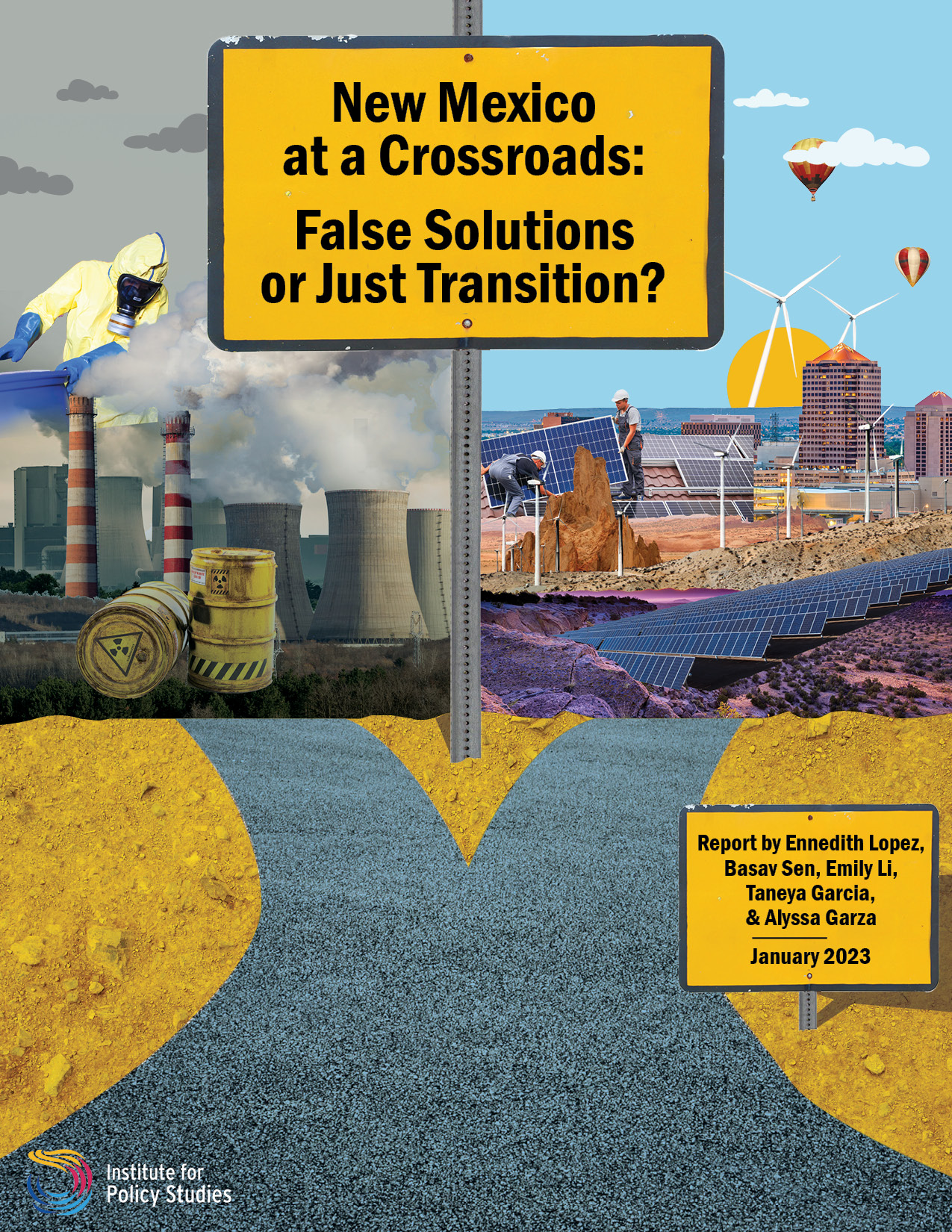New Mexico at a Crossroads: False Solutions or Just Transition?
Ennedith Lopez | Basav Sen | Taneya Garcia | Emily Li | Alyssa Garza
Introduction:
As the fight to transition off fossil fuels and into clean, renewable energy gains momentum, communities and their advocates face several challenges.
These include a fossil fuel industry still lobbying to hold back renewables, promote dirty energy, or else peddling false, “greenwashed” solutions that allow it to continue profiting from pollution. They include the challenge of cleaning up the harmful health and environmental legacy of fossil fuels, as well as the need to ensure that renewable energy sources are owned by, and affordable for, the communities who rely on them.
The state of New Mexico encapsulates all these trends and more. As a poor, climate-vulnerable state as well as a leading fossil fuel producer, New Mexico has made important strides toward an energy transition in recent years. Indigenous and frontline communities in New Mexico have articulated a clear vision of a just transition away from a polluting, extractive economy, and are working to implement their vision. But enormous challenges remain.
This report focuses on the future of renewable energy in New Mexico and how the state could lead on a just transition — and even offer a blueprint for other parts of the country. It also highlights the cost of the use of fossil fuels for New Mexican communities, particularly low-wealth and Indigenous communities.
This report draws upon publicly available information as well as interviews with community organizers and researchers in New Mexico and elsewhere to make the case for centering community-led solutions to the climate and energy crisis.
A summary is available below. For more depth, including extensive background and quotes from our interviews with experts and on-the-ground organizers, you can read the full version.
Key Findings
New Mexico is particularly vulnerable to the impacts of climate change.
- New Mexico has experienced the two largest wildfires in its history over the past year
- The average number of days in a year with temperatures over 90°F in New Mexico is currently 20. This number is expected to double by 2050.
Dirty industries have treated the state like a sacrifice zone, damaging its ecology and poisoning communities while largely funneling profits away.
- New Mexico ranks second for oil and gas production, yet it’s also the third poorest state in the country.
- In addition to greenhouse gas emissions, oil and gas production have polluted the water in an already-water scarce state with toxic and radioactive chemicals.
- Uranium mining was responsible for a tailings dam disaster in 1979, and has left a toxic legacy of 500 severely contaminated abandoned mines.
- The oil and gas industry perpetuates its stranglehold on state policy through large campaign contributions to New Mexico politicians.
- Monopoly investor-owned electric utilities often charge high rates to poorer New Mexicans, a pattern that risks being repeated even if cleaner energy sources are adopted.
- Fossil fuel corporations and their political backers have proposed false solutions like carbon capture and hydrogen, and a nuclear waste storage facility has been proposed in the state as well. These represent a corporate-backed, top-down model of addressing climate change.
- Follow the leadership of people in New Mexico whose communities have been treated like sacrifice zones.
- Address climate change as a complex ecological and social crisis, instead of reducing it to solely a problem of carbon emissions.
- Phase out unjust, polluting industries such as fossil fuels and nuclear energy.
- Repair the historical harm that oil, gas, and nuclear energy have caused to BIPOC and low-wealth communities.
- Incorporate principles of a Just Transition and Energy Democracy into climate change policy.
- Expand real community ownership of renewable energy.
- Explore the possibility of public ownership of the electric grid, instead of relying on self-serving for-profit Investor Owned Utilities.

